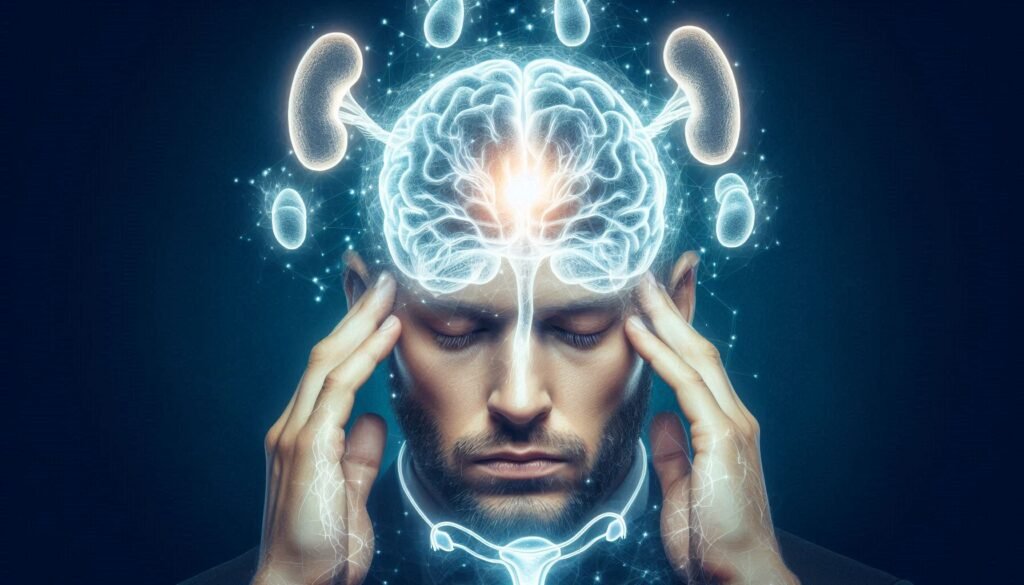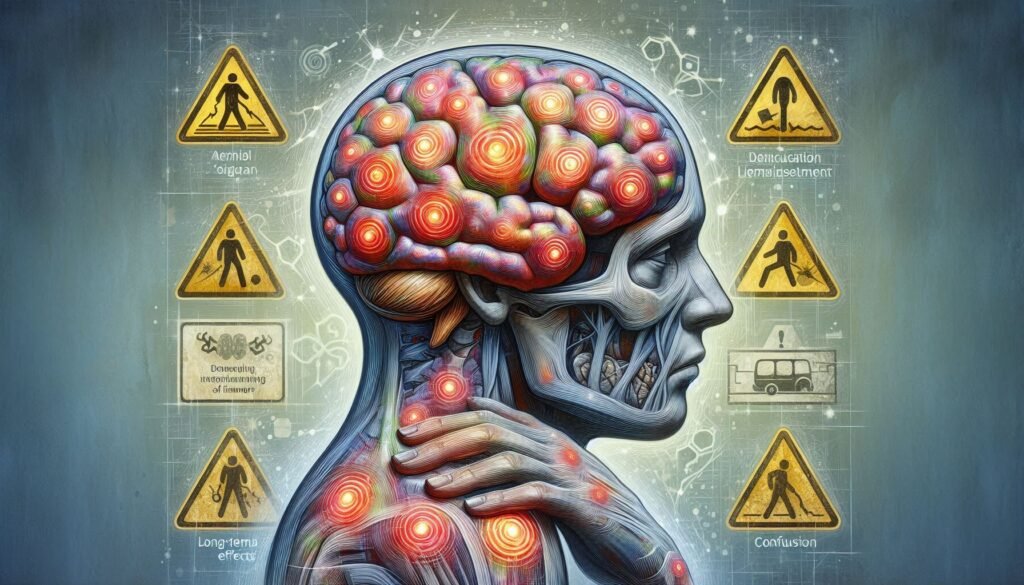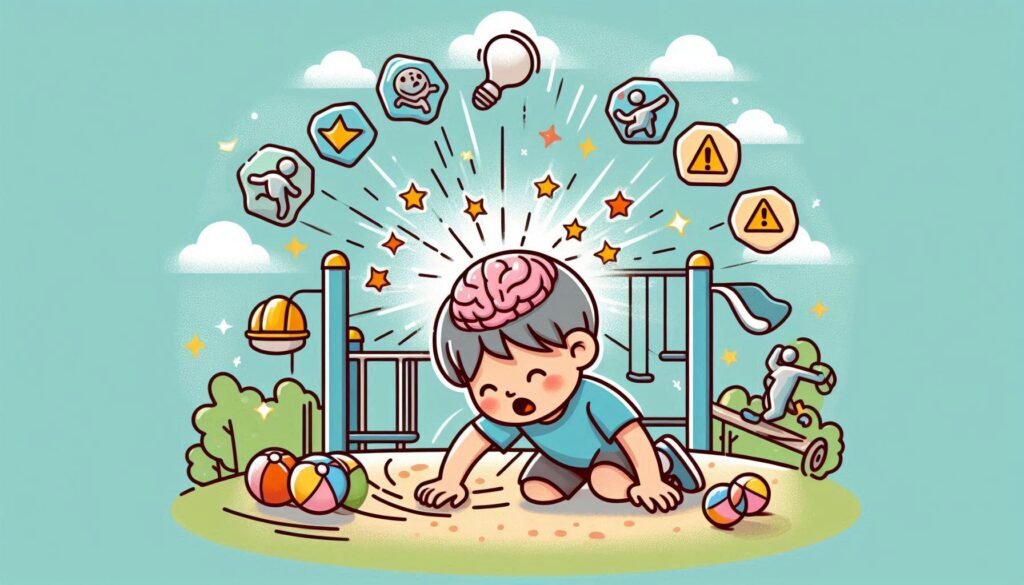Concussions are often seen as straightforward brain injuries, but their consequences can ripple through the body in unexpected ways. Beyond headaches and dizziness, a concussion’s impact on hormonal balance is an area that deserves attention. Many individuals may not realize how a single traumatic event can disrupt hormone production, leading to various health issues.
The endocrine system plays a crucial role in regulating our body’s functions, including mood, metabolism, and overall well-being. When this delicate balance is thrown off by a concussion, it can lead to significant hormonal imbalances that affect both men and women differently.
Understanding these connections between brain injury and hormonal disruption is vital for recovery. As we delve into this topic, we’ll explore the specific hormones affected by concussions and discuss effective strategies for diagnosing and treating these imbalances. Join us on this journey to uncover how brain trauma might be silently influencing your body long after the initial injury has healed.

The Delicate Relationship Between Brain Injury and Hormone Production
The relationship between brain injury and hormone production is intricate and often misunderstood. The brain serves as a command center, regulating various hormones through its communication with the endocrine system. When a concussion occurs, this delicate balance can be disrupted.
Traumatic brain injuries can impair the hypothalamus and pituitary gland’s functions, which are crucial for releasing hormones that control growth, metabolism, and stress responses. This disruption can lead to significant hormonal imbalances in the body.
Furthermore, specific regions of the brain contribute to emotional regulation by influencing hormone levels such as serotonin and cortisol. A concussion may hinder this process, resulting in mood swings or increased anxiety.
Understanding how these connections work helps highlight why post-concussion recovery isn’t just about physical healing; it also involves addressing potential hormonal disruptions that could affect overall health long-term.
Common Hormonal Imbalances Following Concussion
Following a concussion, many individuals experience hormonal imbalances that can significantly affect their overall health. These disruptions often stem from the impact on the brain and its ability to regulate hormone production effectively. The delicate relationship between brain function and hormones makes it crucial to understand these changes.
One common issue is reduced levels of sex hormones such as testosterone and estrogen. This imbalance can lead to various symptoms, including fatigue, mood swings, and decreased libido. Both men and women may find themselves grappling with these effects after sustaining a head injury.
Another frequent disruption involves thyroid hormones. Hypothyroidism or irregular thyroid function can emerge post-concussion, contributing to weight gain, depression, and cognitive difficulties. Addressing these issues promptly is essential for restoring balance.
Additionally, cortisol levels may fluctuate dramatically following a concussion due to stress responses triggered by the injury. Chronic stress from this situation exacerbates existing hormonal problems, creating an ongoing cycle that further complicates recovery efforts.
Pituitary Dysfunction: A Key Player in Post-Concussion Hormonal Issues
The pituitary gland, often referred to as the “master gland,” plays a crucial role in regulating hormone production throughout the body. After a concussion, this small but vital organ can experience dysfunction, leading to significant hormonal imbalances. Given its influence on growth hormones, adrenal function, and reproductive hormones, any disruption here can affect overall health.
Pituitary dysfunction may result from direct injury or secondary effects of brain trauma. This can cause decreased secretion of essential hormones like ACTH (adrenocorticotropic hormone) and TSH (thyroid-stimulating hormone). The resulting deficiencies lead to fatigue, mood swings, weight gain or loss, and other symptoms that severely impact daily life.
Moreover, studies have shown that individuals with post-concussion syndrome are at greater risk for developing hypopituitarism—a condition where the pituitary fails to produce adequate amounts of one or more hormones. Addressing these issues early is vital for recovery.
Understanding how pituitary dysfunction affects hormonal balance helps in recognizing treatment options tailored specifically for those recovering from concussions.
Thyroid Hormones and Concussion: Connections and Consequences
Thyroid hormones play a vital role in regulating metabolism, energy levels, and overall hormonal balance. Following a concussion, disturbances can occur that impact thyroid function. Research indicates that brain injuries may lead to disruptions in the hypothalamic-pituitary-thyroid axis, which controls hormone production.
A decrease in thyroid hormones can contribute to fatigue, weight gain, and mood changes. These symptoms are often seen in individuals recovering from concussions but can be mistakenly attributed solely to the injury itself. The interplay between brain trauma and thyroid dysfunction highlights the complexity of post-injury recovery.
Moreover, low levels of thyroid hormones can exacerbate cognitive deficits often experienced after a concussion. This creates a cycle where poor metabolic health further impairs recovery efforts, making it crucial for healthcare providers to monitor thyroid function during rehabilitation.
For both men and women experiencing hormonal imbalances following head trauma, understanding these connections is essential for effective treatment strategies. Addressing potential thyroid issues early can significantly enhance overall recovery outcomes.
Cortisol Dysregulation: Stress Response After Head Trauma
Cortisol, often dubbed the stress hormone, plays a vital role in our body’s response to stress. After head trauma, such as a concussion, cortisol levels can become dysregulated. This imbalance may lead to heightened sensitivity to stress and an array of emotional disturbances.
When someone experiences a concussion, their body initiates a fight-or-flight response. This triggers the adrenal glands to produce excess cortisol. Over time, elevated cortisol levels can affect mood stability and cognitive function. Individuals may find themselves more anxious or irritable than before the injury.
Conversely, some patients may experience low cortisol production after a concussion. Low levels can result in fatigue and decreased motivation while impairing overall recovery efforts from both physical and mental symptoms.
Understanding how concussions impact hormonal balance is crucial for effective treatment strategies. Addressing cortisol dysregulation is key not just for managing immediate post-concussion symptoms but also for long-term health outcomes.
Sex Hormones and Concussion: Implications for Men and Women
Concussions can significantly affect sex hormones, leading to a range of implications for both men and women. After a brain injury, disruptions in hormone production may occur due to the impact on the hypothalamus and pituitary gland. This disruption can result in altered levels of testosterone, estrogen, and progesterone.
In men, low testosterone levels post-concussion can lead to fatigue, mood swings, reduced libido, and even issues with muscle mass. These symptoms not only affect physical health but also emotional well-being. The psychological effects are often overlooked but have profound impacts on daily life.
For women, hormonal imbalances could disrupt menstrual cycles or exacerbate symptoms of premenstrual syndrome (PMS). Fluctuations in estrogen might lead to increased anxiety or depression as well. These changes highlight the need for comprehensive care following a concussion.
Understanding these potential repercussions is essential for effective treatment strategies tailored to individual needs. Addressing sex hormone levels after head trauma could improve recovery outcomes significantly.
Diagnosing Hormonal Imbalances in Concussion Patients
Diagnosing hormonal imbalances in concussion patients requires a comprehensive approach. Medical professionals often start with a thorough patient history and physical examination. Symptoms like fatigue, mood swings, or changes in libido can signal underlying issues related to hormone production.
Blood tests play a crucial role in this diagnostic process. These tests evaluate levels of key hormones such as cortisol, thyroid hormones, and sex hormones. Clinicians may also assess anterior pituitary function since it regulates various endocrine glands.
Imaging studies may be necessary for some patients to rule out serious complications from the concussion itself. MRI or CT scans can reveal any structural abnormalities that could be impacting hormone regulation.
Additionally, specialized assessments like dynamic endocrine testing might be employed to understand how well the body responds to stressors post-concussion. This multifaceted approach ensures an accurate diagnosis and paves the way for targeted treatment strategies tailored to individual needs.
Treatment Options for Concussion-Related Hormonal Disruptions
Addressing concussion-related hormonal disruptions requires a multifaceted approach. The first step often involves hormone replacement therapy, which can help restore balance for hormones like cortisol and sex hormones. This treatment aims to alleviate symptoms and improve overall well-being.
Lifestyle changes play a significant role in recovery as well. A balanced diet rich in vitamins and minerals supports endocrine function. Regular exercise enhances mood and energy levels, while proper sleep is crucial for hormone regulation.
In some cases, psychotherapy or counseling may be beneficial. Mental health support helps individuals cope with the emotional aftermath of concussions while addressing anxiety or depression that could further disrupt hormonal balance.
Additionally, working closely with healthcare professionals who specialize in endocrinology or sports medicine can provide tailored treatment plans based on individual needs. Monitoring hormone levels through regular lab tests ensures that interventions remain effective over time.
Long-Term Effects of Hormonal Imbalances Post-Concussion
Hormonal imbalances following a concussion can lead to persistent issues that extend far beyond the initial injury. Many individuals experience fatigue, mood swings, and cognitive difficulties long after the event. These symptoms often stem from disrupted hormone production and regulation.
One significant concern is the potential for chronic fatigue syndrome. This condition may develop due to hormonal dysregulation, leaving many feeling drained and unable to participate in daily activities fully. The impact on quality of life can be profound.
Additionally, fluctuations in sex hormones can affect reproductive health and libido. Both men and women might notice changes in their sexual function or emotional well-being as a result of these hormonal shifts.
Emotional disturbances such as anxiety or depression are common long-term effects too. Hormones play a crucial role in mental health, making it essential to address any imbalances early on for better overall recovery outcomes.
Lifestyle Modifications to Support Hormonal Recovery
Lifestyle modifications can play a crucial role in supporting hormonal recovery after a concussion. Making small, consistent changes to daily habits may help restore the balance disrupted by brain injury.
A balanced diet rich in whole foods is vital. Focus on incorporating plenty of fruits and vegetables, lean proteins, healthy fats, and whole grains. Specific nutrients like omega-3 fatty acids found in fish or flaxseed may promote brain health and hormone regulation.
Regular exercise also helps improve mood and energy levels while aiding hormonal balance. Aim for moderate activities such as walking or swimming. However, be cautious not to overexert yourself during recovery.
Quality sleep cannot be overstated; it is essential for hormone production and overall wellbeing. Prioritize good sleep hygiene practices—creating a comfortable sleep environment, maintaining a regular schedule, and avoiding screens before bed can assist with restful slumber.
Stress management techniques such as mindfulness meditation or yoga are helpful too. These practices alleviate stress hormones that could further disrupt your endocrine system post-concussion.
Building connections with healthcare providers knowledgeable about concussion’s impact on hormonal balance ensures you receive tailored support throughout your recovery journey. Combining these lifestyle strategies fosters an optimal environment for healing both the brain and body following trauma.


